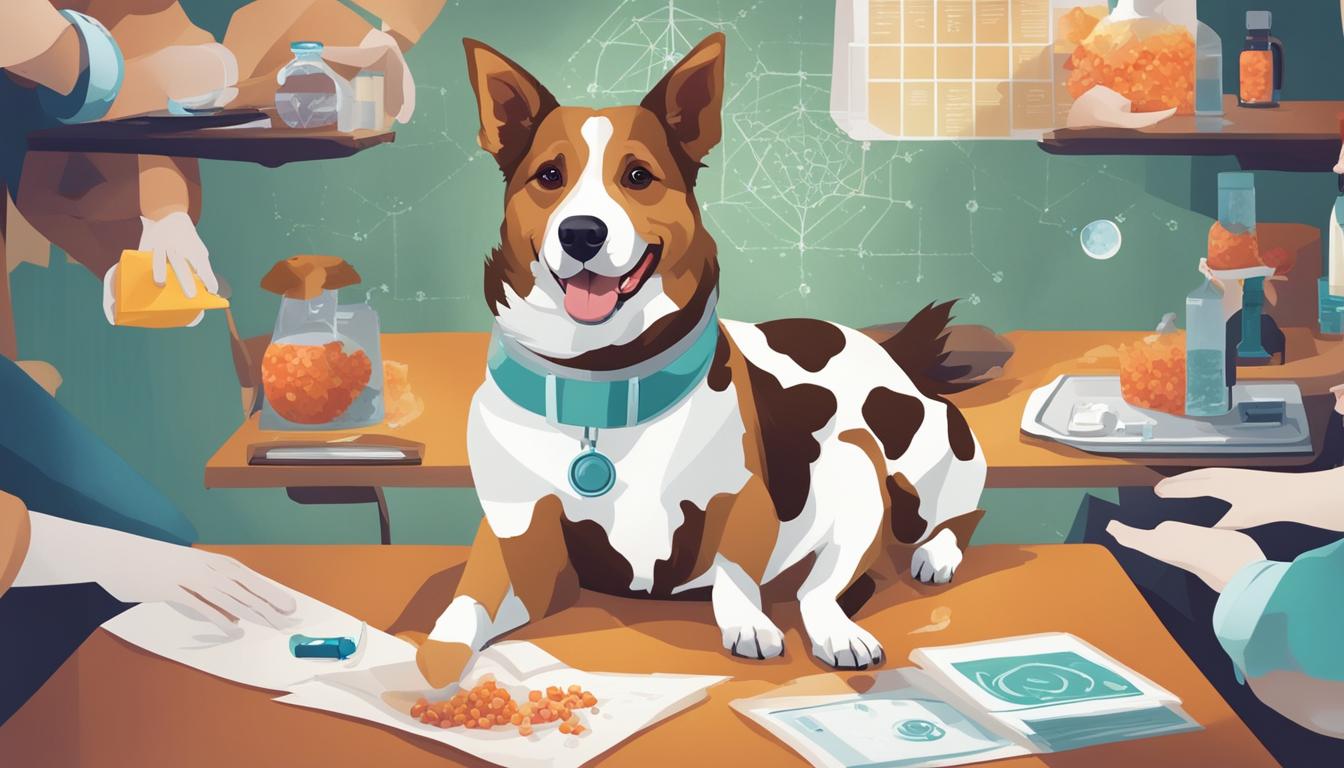Hey there! Have you ever wondered if your furry buddy can catch hepatitis A, just like people do? Well, let’s dive into the world of dog liver diseases and clear some things up. Dogs, like us, can definitely have liver problems. Their liver is super important—it helps break down food, gets rid of toxins, and keeps vitamins handy for when your dog needs them. While there’s a thing called canine hepatitis, it’s not the same as hepatitis A that humans get.
When it comes to pet health concerns, it’s good to know what could make our pups sick, so we can keep them as happy and healthy as possible. Let’s get the facts straight about liver health in our canine pals!
Key Takeaways
- The liver is majorly important for your dog’s health.
- Hepatitis A in dogs isn’t a thing—canine hepatitis is different.
- Dogs’ liver problems can be serious, just like in humans.
- Knowing about dog liver diseases helps you care for your pet.
- Staying informed is key to preventing pet health concerns.
Understanding Hepatitis in Dogs: An Overview
Dogs are a lot like us in some ways. They need a good liver to stay healthy, just like people do. The liver is a big part of how dogs stay healthy, helping their bodies clean out the bad stuff and use the food they eat. Let’s talk about what happens when a dog’s liver gets sick, how important their liver is, and the different kinds of liver sickness dogs can get.
What is Hepatitis?
When a dog has hepatitis, it means their liver is not feeling well. The liver gets all swollen and it hurts. This can make your dog feel very sick because the liver has a lot of work to do in their body.
Role of the Liver in Canine Health
A dog’s liver is super important. It helps break down food to give them energy and cleans their blood. If the liver is not working right, everything else can start having trouble too.
Different Types of Canine Hepatitis
There are different kinds of hepatitis in dogs. Some dogs get sick really quickly with a lot of pain, and some dogs are sick for a long time. But why do they get sick? Well, sometimes it’s just because they were born more likely to get liver problems, especially certain types of dogs.
| Type of Dog Hepatitis | Acute Hepatitis | Chronic Hepatitis |
|---|---|---|
| Description | When a dog gets sick really fast and the liver gets very inflamed. | When a dog’s liver is inflamed for a long time, maybe even because of their genes. |
| Breeds at Risk | All breeds can get this kind of hepatitis. | Some breeds like Bedlington terriers or West Highland white terriers have a higher chance. |
| Cause | Can be caused by infections or toxins. | Often linked to too much copper built up in the liver. |
Inflammation in a dog’s liver can really make them feel yucky. Imagine trying to play fetch, but you’re just too tired and don’t feel like it. That’s what might happen when a dog’s liver gets inflamed. Now that you know more about your furry friend’s liver health, let’s make sure we keep them as healthy and happy as possible!
Comparing Hepatitis A in Humans to Canine Hepatitis
When it comes to liver health, understanding the differences between human and dog diseases is crucial. While hepatitis A is a human-specific issue, dogs have their unique health concerns. Let’s take a closer look at these differences!
What Is Hepatitis A?
Hepatitis A is an illness that humans can catch. It spreads when someone touches something with the virus on it and then touches their mouth. This can happen if food or water has the virus. Hepatitis A doesn’t happen in dogs, so that’s one less thing for dog lovers to worry about!
Can Dogs Get Hepatitis A?
Even though dogs can’t get hepatitis A, they have their type of hepatitis. It can also make them feel really sick. But, it’s not the same as the type people get. This is important to remember because it means humans and dogs can’t share hepatitis A.
Transmission Differences Between Species
The way hepatitis A is passed around among people is different from how dogs can get their type of hepatitis. One big word for this is transmission. Humans get it through a fecal-oral route, which sounds yucky, but it means from dirty hands or food. Dogs can catch their own kind of hepatitis in other ways, like from other dogs’ saliva or pee.
Understanding cross-species disease risks is very important for keeping everyone safe – both two-legged and four-legged friends! Have a look at how human vs. dog hepatitis compare:
| Disease | Humans | Dogs |
|---|---|---|
| Hepatitis Type | Hepatitis A | Infectious Canine Hepatitis |
| How It’s Caught | Fecal-Oral Transmission | Direct Contact with Infected Dogs |
| Can It Jump Between Species? | No | No |
Remember, even though it’s called ‘hepatitis’, the kind people get isn’t the same as what dogs get. Staying informed can help us take better care of our pet pals and ourselves!
Key Liver Functions and Why Hepatitis Is a Concern for Dogs
The liver is like a super-hero organ for your dog, doing lots of important jobs to keep your furry friend healthy. It’s super important for your dog’s liver to be healthy so it can do things like break down food and clean the blood. This is called metabolism and detoxification. When something’s not right, like hepatitis, it can cause big problems. Let’s learn why the liver is so important and what happens when it gets sick.
The Liver’s Role in Metabolism and Detoxification
Your dog’s liver helps turn the food they eat into energy and nutrients the body can use. It’s also like a filter that cleans out the bad stuff from their body. This big job is part of why the importance of liver health in dogs can’t be ignored.
When the Liver Gets Inflamed: Acute and Chronic Hepatitis
Sometimes a dog’s liver can become swollen and hurt, which is what happens with hepatitis. There are two types: acute and chronic. Acute is a fast sickness that hits hard, and chronic is a slow sickness that can last a long time. Both can make your dog feel really bad and lead to scary things like yellow skin, called jaundice, and other health troubles. That’s why vets always watch for signs of liver inflammation during check-ups.
| Function of the Liver | Effects of Hepatitis |
|---|---|
| Metabolizes nutrients from food | Not enough nutrients for health |
| Detoxifies the body | Buildup of toxins can make your dog sick |
| Produces blood clotting factors | Risk of bleeding from small injuries |
Just like we need to eat right and exercise, dogs also need to keep their livers in tip-top shape for all these important jobs. This is a big reason why the importance of liver health in dogs can’t be overstated—because a healthy liver means a happy, healthy dog!
Common Causes of Liver Disease in Dogs
Your furry friend’s liver health is super important. Just like people, dogs can get sick from different things that hurt their liver. Some dog breeds might even have a higher chance of having liver problems. Let’s dig into what can cause liver disease in dogs!
Infectious Agents and Chemical Exposure
Sometimes, germs like viruses and bacteria can make dogs super sick and cause liver disease. If your dog plays where it’s dirty or drinks yucky water, they could catch something bad. Also, dangerous stuff like poisons or certain meds can make their liver sick. Always keep an eye on your dog to make sure they don’t chew on or eat anything harmful!
Genetic Predispositions in Canines
Some dog breeds are born with a higher risk of liver problems. For example, certain kinds of terriers might get liver disease more often than other dogs. This might happen because their bodies keep too much copper, which is not good for their liver. If you’re not sure about your dog’s liver health, asking your vet is a good idea!
Wondering what can hurt your dog’s liver? Look at this table to see common causes based on dog breeds and stuff in their environment:
| Dog Breed | Genetic Risk Factor | Common Environmental Hazards |
|---|---|---|
| Terriers | High copper accumulation | Toxic plants, chemicals, bad food |
| Labradors | Prone to obesity-related liver issues | Medications, heavy metals |
| Dalmatians | Urate stones affecting the liver | Contaminated water, pesticides |
Keeping your dog safe from these things will help their liver health. If you can, give your dog good food, clean water, and lots of love to keep them feeling their best!
Symptoms of Liver Issues in Dogs: Recognizing the Signs
If you think your furry friend might have liver problems, it’s important to look out for certain signs. Dogs with liver disease may show different symptoms, and it’s key for you to know them. This can help you catch liver issues quickly, which is good for your dog’s health. The following are some common canine hepatitis symptoms and other liver health signs you should watch for:
- Low energy: Your dog might seem tired or less playful.
- Not eating much: They may lose interest in food or eat less than usual.
- Upset stomach: Your dog might vomit, have diarrhea, or both.
- Weight loss: Even if your dog eats, they may start to lose weight.
- Jaundice: Look for yellowing in their eyes, gums, or skin. This is called jaundice.
- Drinking more water: If your dog is always thirsty and drinks more than usual, it could be a sign.
- Odd behavior: If your pup acts in new or unusual ways, like hiding or being grumpy, this could be a symptom.
Please remember, if you see these signs, take your dog to the vet. They will check if your dog has liver disease and will help them get better.
| Sign to Watch | Detail |
|---|---|
| Energy Levels | Does your dog seem tired or less interested in playing? |
| Eating Habits | Is your dog not eating much or at all? |
| Stomach Upset | Any vomiting or diarrhea? |
| Weight Changes | Noticeable weight loss even if eating regular meals? |
| Skin and Eyes | Yellow tint to the eyes, gums, or skin? |
| Thirst Levels | Is your dog drinking much more water than normal? |
| Behavior Changes | New or odd behaviors, like hiding or snapping? |
By recognizing liver disease in dogs and knowing what to look for, you can help your dog stay as healthy as possible. Always talk to your vet with any worries you have about your dog’s health!
Diagnostic Approaches for Liver Health in Dogs
When your furry friend isn’t feeling well, vets have special ways to check if their liver is healthy. The liver is super important because it cleans out bad stuff from their body and helps them use their food for energy. Sometimes, though, their liver can get sick, and the vet needs to check it carefully.
Assessing Liver Enzyme Levels: ALT and AST
Vets use blood tests to measure things called enzymes in your dog’s liver. Two big ones are called ALT and AST. If these are high, it might mean the liver cells are hurt. Think of these tests like a special doggy report card that shows how well the liver is doing its important cleaning job.
The Importance of Biopsy for Determining Liver Conditions
Sometimes, to really understand what’s going on with the liver, the vet needs to take a tiny piece of it, called a biopsy. It’s like taking a really small bit of playdough out of a model to see what’s inside. This little sample helps the vet figure out the best way to help your dog feel better. It’s a super useful tool for diagnosing liver disease and coming up with a plan to make your pet healthy again!
FAQ
Can dogs contract hepatitis A?
No, dogs cannot contract hepatitis A as it is a virus specific to humans, which is spread through fecal-oral contamination and does not affect canines.
What is canine hepatitis and how does it differ from hepatitis A?
Canine hepatitis refers to the inflammation of the liver in dogs, typically caused by infectious agents, certain drugs, or underlying health issues. It is different from hepatitis A in humans and can be either acute or chronic in nature.
What role does the liver play in a dog’s health?
The liver is essential for a dog’s health, handling crucial functions like metabolism, detoxification, and storage of vitamins. It processes nutrients and helps in maintaining overall health and vitality in dogs.
Are certain dog breeds more prone to liver disease?
Yes, some breeds such as Bedlington terriers and West Highland white terriers have genetic predispositions to chronic liver disease, often associated with copper accumulation.
What are the types of hepatitis in dogs?
Dogs can suffer from various types of hepatitis with the most common being infectious canine hepatitis and chronic hepatitis. The chronic form can be due to genetic predispositions or idiopathic in nature.
How does hepatitis impact a dog’s liver function?
When a dog has hepatitis, its liver becomes inflamed which can impede its ability to metabolize nutrients, detoxify the body, and store essential vitamins. This can lead to significant health issues including jaundice and seizures.
What are the symptoms of liver issues in dogs?
Symptoms of liver disease in dogs can range widely, from severe issues such as coma or seizures in acute cases, to weight loss, vomiting, jaundice, depression, or changes in appetite and thirst in chronic conditions.
How is liver disease in dogs diagnosed?
Vets diagnose liver disease in dogs by conducting blood tests to check liver enzyme levels like ALT and AST, which indicate liver cell damage. Biopsies are also a crucial tool to accurately diagnose and differentiate various liver conditions.


